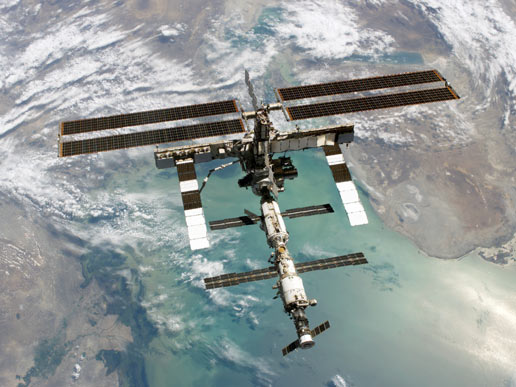
The International Space Station. Credit: NASA
Monday, May 7, 2012
UNITED LAUNCH ALLIANCE ATLAS V ROCKETS LIFTED OFF TO SPACE
FROM: U.S. AIR FROCE
United Launch Alliance Marks 60th Successful Launch by Delivering the AEHF-2 Satellite to Orbit for the U.S. Air Force
5/4/2012 - Cape Canaveral Air Force Station, Fla., -- A United Launch Alliance (ULA) Atlas V rocket carrying the Advanced Extremely High Frequency-2 (AEHF-2) satellite for the United States Air Force lifted off from Space Launch Complex-41 here at 2:42 p.m. EDT today. This was ULA's 4th launch of an aggressive 11 mission schedule for the year and marks the 30th Atlas V mission and the 60th launch for ULA.
"ULA is proud to serve alongside our mission partners and privileged that the Air Force entrusts the ULA team to deliver critical national security capability to orbit for our soldiers, sailors, airman and Marines around the world," said Jim Sponnick, ULA vice president, Mission Operations. "Through our focus on attaining Perfect Product Delivery, ULA remains dedicated to providing reliable, cost-effective launch services while continuing our unwavering commitment to 100 percent mission success. Today's successful launch was the 60th since ULA was formed just over five years ago and we congratulate the AEHF team on this important step toward delivering these critical protected communications capabilities."
This mission was launched aboard an Atlas V Evolved Expendable Launch Vehicle (EELV) 531 configuration vehicle, which includes a 5-meter diameter RUAG Space payload fairing along with three Aerojet solid rocket motors attached to the Atlas booster. The Atlas booster for this mission was powered by the RD AMROSS RD-180 engine and the Centaur upper stage was powered by a single Pratt & Whitney Rocketdyne RL10A engine.
The AEHF constellation is a joint-service satellite communications system that will provide survivable, global, secure, protected and jam-resistant communications for high-priority military ground, sea and air assets.
Developed by the United States Air Force to provide assured access to space for Department of Defense and other government payloads, the EELV Program supports the full range of government mission requirements, while delivering on schedule and providing significant cost savings over the heritage launch systems.
ULA's next launch is the Atlas V NROL-38 mission for the National Reconnaissance Office scheduled June 18 from Space Launch Complex-41 at Cape Canaveral Air Force Station, Fla.
ULA program management, engineering, test, and mission support functions are headquartered in Denver, Colo. Manufacturing, assembly and integration operations are located at Decatur, Ala., and Harlingen, Texas. Launch operations are located at Cape Canaveral AFS, Fla., and Vandenberg AFB, Calif.
Sunday, May 6, 2012
Saturday, May 5, 2012
SPACEX PREPARES FOR LAUNCH
FROM: NASA
SpaceX and NASA Prepare for Launch
In a processing facility at Space Launch Complex-40 on Cape Canaveral Air Force Station in Florida, Space Exploration Technologies technicians attach the Dragon capsule to the second stage of the company’s Falcon 9 rocket. Known as SpaceX, the launch will be the company's second demonstration test flight for NASA's Commercial Orbital Transportation Services program, or COTS. During the flight, the capsule will conduct a series of check-out procedures to test and prove its systems, including rendezvous and berthing with the International Space Station. If the capsule performs as planned, the NanoRacks-CubeLabs Module-9 experiments and other cargo aboard Dragon will be transferred to the station. The cargo includes food, water and provisions for the station’s Expedition crews, such as clothing, batteries and computer equipment. Under COTS, NASA has partnered with two private companies to provide resupply missions to the station. The launch is TBD. For more information, visit http://www.nasa.gov/spacex. Photo credit: NASA/Jim Grossmann
Friday, May 4, 2012
JAPANESE PRIME MINISTER YOSHIHIKO NODA ACCEPTS MONTAGE FROM NASA ADMINISTRATOR CHARLES BOLDEN
FROM: NASA
Japanese Prime Minister Yoshihiko Noda, fourth from left, accepts a montage from NASA Administrator Charles Bolden, third from left, during a meeting at the Blair House as Associate Administrator for Science and former astronaut John Grunsfled, left, Associate Administrator for Education and former astronaut Leland Melvin, second from left, and JAXA (Japan Aerospace Exploration Agency) astronauts Koichi Wakata and Satoshi Furukawa, right, look on, Monday, April 30, 2012, in Washington. Image Credit: NASA/Bill Ingalls
Wednesday, May 2, 2012
MAIDEN VOYAGE OF SPACE SHUTTLE COLUMBIA
FROM: NASA
On April 12, 1981, astronauts John Young and Bob Crippen launched into space on space shuttle Columbia on the STS-1 mission--NASA's first mission aboard a reusable spacecraft. STS-1 was NASA's first manned mission since the Apollo-Soyuz Test Project in 1975. In this image, the two solid rocket boosters are aglow after being jettisoned. Image Credit: NASA
On April 12, 1981, astronauts John Young and Bob Crippen launched into space on space shuttle Columbia on the STS-1 mission--NASA's first mission aboard a reusable spacecraft. STS-1 was NASA's first manned mission since the Apollo-Soyuz Test Project in 1975. In this image, the two solid rocket boosters are aglow after being jettisoned. Image Credit: NASA
Subscribe to:
Comments (Atom)


